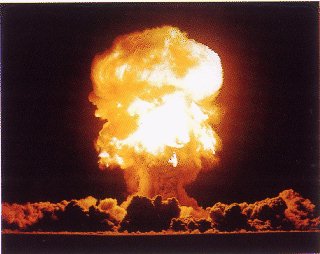"You're about as easy as a nuclear war"

That is the first time I've ever quoted a Duran Duran lyric, and quite possibly the last.
One of my worst/best traits is to joke about serious things. They don't come more serious than nuclear war.
I wonder who will use the Bomb first- Iran, Israel or the US? (Sorry, the US has used them twice before, but, hey, stick that down the Memory Hole).
Sorry for all the heaviness, but I've just seen this on the BBC website.
Iran breaks seals at nuclear site
Iran has removed international seals from a nuclear facility and will begin research there in the coming hours, the UN nuclear watchdog the IAEA has said.
The move ends a two-year suspension of research, and could result in Tehran being referred to the UN Security Council for possible sanctions.
France and the UK both called the move a "grave error".
Western countries fear Iran's nuclear programme could be used to make atomic bombs, but Tehran denies such a goal.
It says the project is for the peaceful production of energy only.
"What we [have resumed] is merely in the field of research, not more than that," the deputy head of the Atomic Energy Organisation of Iran, Mohammad Saeedi, said on Tuesday.
"We distinguish between research on nuclear fuel technology and production of nuclear fuel. Production of nuclear fuel remains suspended."
The resumption of research on Tuesday at the Natanz site suggests all of Iran's nuclear activities, apart from uranium enrichment - a key stage in making a nuclear bomb - have been revived.
The US and EU immediately condemned the latest move.
Gregory Schulte, the US ambassador to the IAEA, said it showed Iran's "disdain for international concerns and its rejection of international diplomacy".
A spokeswoman for EU foreign policy chief Javier Solana said Iran's move "is very much a step in the wrong direction.
"We are extremely concerned and consultations are taking place (within the EU) to co-ordinate a response," Cristina Gallach told Reuters news agency.
Mr Straw, briefing Arab media in London, said Iran was "pushing its luck with the international community".
But the BBC's Frances Harrison in Tehran says threats of economic or military sanctions against Iran - with oil prices high and the US and UK militaries tied down in Iraq - are not realistic.
Serious punitive action cannot be taken against them at the moment, she says.
Iran resumed uranium conversion, an earlier stage in the nuclear fuel cycle, at its plant in Isfahan when negotiations with the EU broke down in August.
In September, the IAEA's board called on Iran to cease all nuclear fuel work, and threatened to refer Tehran to the Security Council.
An interim report in November revealed that Iran had information on how to build a key part of an atomic weapon from the network of disgraced Pakistani nuclear scientist AQ Khan.
Iran insisted it had neither requested the information nor used it.
Tehran suspended uranium conversion activity in 2004 before restarting it last August.
It has always said has the right under the nuclear Non-Proliferation Treaty - which it has signed - to research nuclear energy for peaceful purposes.
But Washington, Israel and many European powers distrust Iran, partly because it had kept its nuclear research secret for 18 years before it was revealed in 2002.
IRAN'S NUCLEAR STANDOFF
September 2002: Work begins on Iran's first nuclear reactor at Bushehr
December 2002: Satellite photographs reveal nuclear sites at Arak and Natanz; Iran agrees to an IAEA inspection
September 2003: IAEA gives Iran weeks to prove it is not pursuing atomic weapons
November 2003: Iran suspends uranium enrichment and allows tougher inspections; IAEA says no proof of any weapons programme
June 2004: IAEA rebukes Iran for not fully co-operating with nuclear inquiry
November 2004: Iran suspends uranium enrichment as part of deal with EU
August 2005: Iran rejects EU proposals and resumes work at Isfahan nuclear plant
January 2006: Iran removes seals at Natanz facility
NUCLEAR FUEL CYCLE
Mined uranium ore is purified and reconstituted into solid form known as yellowcake
Yellowcake is converted into a gas by heating it to about 64C (147F)
Gas is fed through centrifuges, where its isotopes separate and process is repeated until uranium is enriched
Low-level enriched uranium is used for nuclear fuel
Highly enriched uranium can be used in nuclear weapons
We've got a religious fundamentalist as US President and another one as Iranian President. One has nukes and one could get nukes before not too long. This is not good. At least the USA & Iran aren't in the same group in this summer's World Cup...


0 Comments:
Post a Comment
<< Home